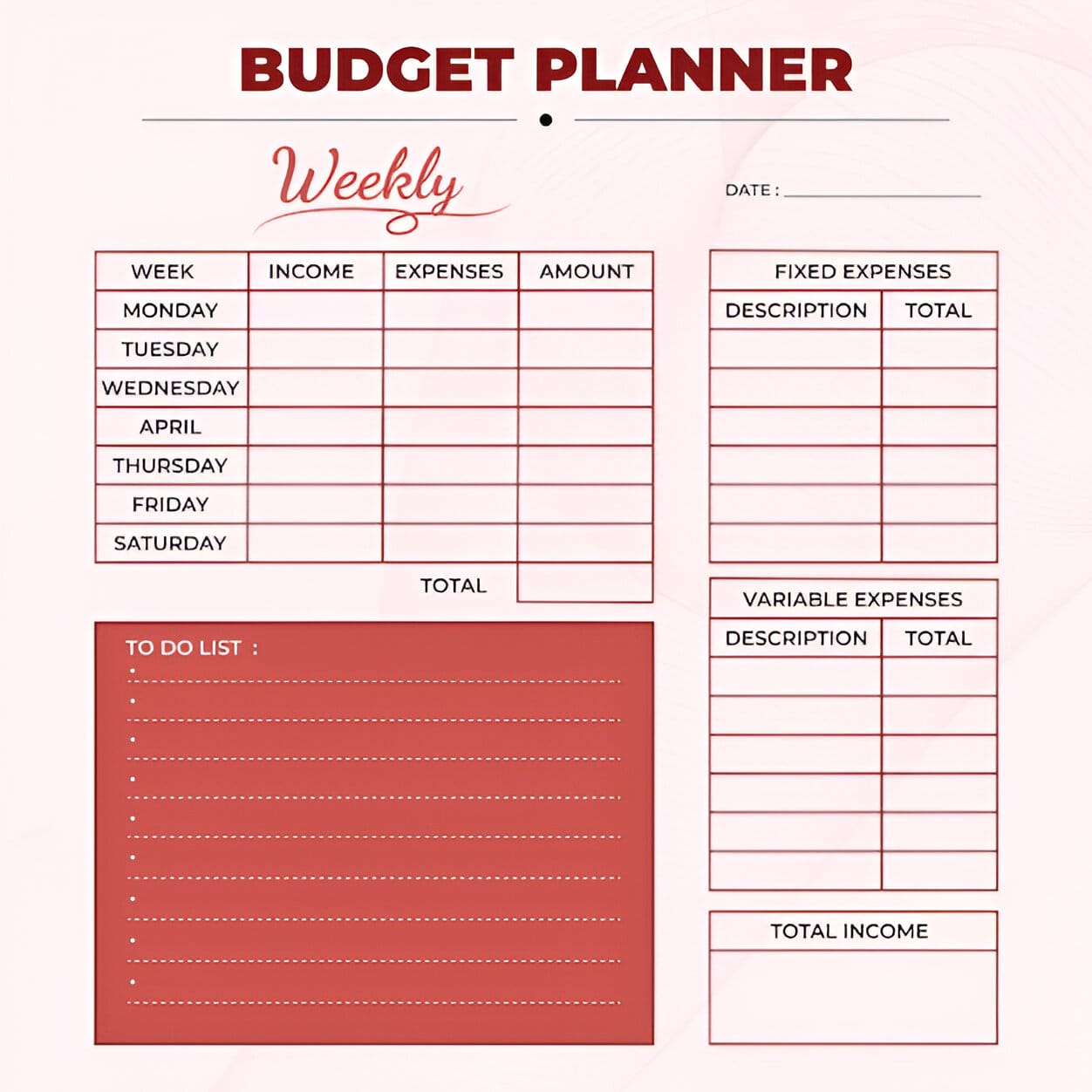
Easy Ways to Create a Weekly Budget Plan
Managing finances can be a daunting task but the key to financial success is budgeting. Yes, we have all heard about the importance of budgeting but how many of us actually follow through with it? One way to make budgeting more manageable is by creating a weekly budget plan.
A weekly budget plan is an effective way to keep track of your expenses and save money. Today, I will guide you through the steps to create a weekly budget plan that will help you stay on top of your finances.
Related Reading: Best Budgeting Strategies for Students
Why You Need a Weekly Budget Plan

Before I discuss the steps to creating a weekly budget plan, let's talk about why it's important to have one. Here are some reasons why a weekly budget plan is essential:
- Helps you stay organized: A weekly budget plan allows you to map out your expenses for the week and keep track of where your money is going.
- Encourages mindful spending: When you have a set budget for the week, you are more likely to think twice before making unnecessary purchases.
- Helps you save money: By setting a budget and sticking to it, you can identify areas where you may be overspending and make adjustments to save money.
- Reduces financial stress: With a weekly budget plan in place, you can have peace of mind knowing that your finances are under control. This can alleviate financial stress and ease anxiety.
- Improves financial management skills: By consistently creating and following a weekly budget plan, you can improve your financial management skills. This includes tracking expenses, prioritizing spending, and making informed decisions about your finances.
Steps to Create a Weekly Budget Plan
Creating a weekly budget plan may seem daunting at first, but with these simple steps, you can easily get started:
1) Track Your Expenses
The key to creating an effective weekly budget starts with tracking your spending. This includes all of your monthly bills, such as rent/mortgage, utilities, and insurance payments. It also includes daily expenses like groceries, transportation costs, and entertainment.
2) Categorize Your Expenses

After tracking your expenses, it’s essential to organize them into two categories: fixed expenses and variable expenses. Fixed expenses are those that stay the same every month, while variable expenses can vary from week to week. This will help you create a more accurate and realistic budget plan.
Some common fixed expenses include:
- Rent/Mortgage
- Utilities (electricity, water, gas)
- Insurance (health, car, home)
- Loan payments (student loans, car loans)
Variable expenses may include:
- Groceries
- Transportation costs (gas, public transportation)
- Entertainment (dining out, movies, concerts)
- Personal care (haircuts, gym membership)
Once you have identified your fixed and variable expenses, then prioritize them based on necessity. This will help you see where you can potentially cut back if needed in order to stay within your budget.
3) Set Your Income

Next, You should determine your weekly earnings. Yes it's true, people don't often get paid on a weekly basis but for the sake of this exercise, we will use weekly numbers to make it easier to calculate.
If you get paid monthly, simply divide your monthly income by four to get a weekly average. This will give you an idea of how much money you are bringing in weekly and you can then use that as the basis for your budget.
For example, if your monthly income is $4,000, divide that by four to get a weekly average of $1,000. This will be the amount you use to create your weekly budget plan.
4) Creating a Weekly Budget Plan
Now that you have calculated your weekly average income, it's time to create a budget plan for the week. This will help you keep track of your expenses and ensure that you are staying within your means.
- Start by listing all of your fixed expenses for the week, such as rent, utilities, and loan payments.
- Next, list out any variable expenses like groceries, gas, dining out, etc.
- Allocate an appropriate amount for each expense based on your income and priorities.
- Make sure to set aside some money for savings or emergency funds.
- Stick to this budget plan throughout the week and make adjustments as needed.
Creating a budget can also involve finding ways to reduce your expenses. This can include cutting back on unnecessary purchases, finding more affordable alternatives, or negotiating for better deals with service providers. So constantly evaluate your budget and make changes when necessary in order to stay on track financially.
Must Read: How to Reduce Expenses Without Feeling Deprived
5) Monitor Your Progress Each Week
Maintaining consistency is essential for effective budgeting. Set aside a few minutes at the end of each week to review your spending. Ask yourself:
- Did I get close to my weekly targets?
- Did encounter any unforeseen expenses?
- Is there a pattern to my spending habits?
Use this reflection time to spot areas for improvement. Maybe you spent a little extra on takeout, or a sale tempted you to buy new clothes. That’s okay, because budgeting is about learning, not always perfection.
6) Make Adjustments Without Stress
Life is full of surprises, which is why your budget needs the flexibility to adapt. If you overspend in one category, try to balance it out by reducing spending elsewhere the following week. For example:
- Overspending on groceries? Consider eating out less or skipping snacks next week.
- Gas expense higher than usual? Limit other variable expenses until you're back on track.
The point of a weekly budget plan is not to restrict you, but to empower you with control over your money.
7) Use Technology to Make Budgeting Easier
There are many budgeting apps ready to help you stay organized. In 2025, options like Mint, YNAB, and Goodbudget continue to offer features tailored for people looking to create a weekly budget plan. Set up alerts, track expenses, and get visual dashboards to make financial management less of a chore.
Explore different apps to discover the one that best complements your lifestyle. A good app will help you track income, sort expenses into categories, and generate helpful reports.
8) Build in Rewards for Your Discipline
Sticking to a weekly budget plan doesn’t mean you have to cut out all fun. Set aside a small “reward fund” that you use if you meet your goals. This could be a coffee treat, a movie night, or a small personal purchase. Positive reinforcement helps you stay motivated and makes budgeting a habit rather than a burden.
9) Involve Family or Roommates
If you share expenses with others, like roommates or family, communicate openly about your budget plan. Agree on how to split bills, groceries, and shared services. Transparency prevents misunderstandings and helps everyone stay on the same page.
Example: Simple Weekly Budget Plan
Here’s a example of how to create a weekly budget plan on a $500 weekly income:
Category | Weekly Allowance |
|---|---|
Rent/Utilities | $200 |
Groceries | $70 |
Transportation | $30 |
Entertainment | $40 |
Dining Out | $30 |
Savings/Emergency | $50 |
Miscellaneous | $30 |
Total | $450 |
This leaves $50 as a small buffer, which you can roll over or use for unexpected expenses.
10) Tips to Help You Stick with Your Weekly Budget Plan
- Automate what you can: Set bills and savings to auto-pay.
- Keep receipts for the week: Helps with tracking and accountability.
- Check free events: Look for campus or community events that don’t cost money.
- Review and reset: Use Sundays to look back and plan for the next week.
- Pack your lunch: Eating out adds up, so plan and pack meals at home.
Final Words
Learning how to create a weekly budget plan is a powerful step toward financial freedom. Remember, your budget is a tool to make your life easier, not harder. Keep things simple, stay consistent, and don’t be afraid to adjust as your needs change.
Take charge of your finances with a well-structured weekly budget plan. With practice and the right mindset, you’ll build habits that last a lifetime, and reach your financial goals one week at a time. Don't forget to celebrate your successes and learn from any mistakes along the way.
Frequently Asked Questions
What if I have a variable income?
It's important to account for any variability in your income when creating your budget plan. Make sure to include an average or minimum amount in your budget and adjust accordingly when you receive additional income.
Can I still enjoy my favorite things while sticking to a budget?
Absolutely! Budgeting doesn't mean giving up all the things you love, it just means being mindful of your spending and finding ways to enjoy them within your means. Look for deals, discounts, or alternative options that fit within your budget.
How can I stay motivated when facing challenges in sticking to my budget?
Sticking to a budget is not always easy, especially when unexpected expenses arise. To stay motivated, remind yourself of your long-term financial goals and the benefits of sticking to your budget. Also, consider finding an accountability partner or joining a support group for additional encouragement and tips.
How do I handle irregular or seasonal income when budgeting weekly?
If your income fluctuates, base your weekly budget on your average monthly income or your lowest-earning weeks. This will help you set a realistic budget and avoid overspending during high-income weeks.